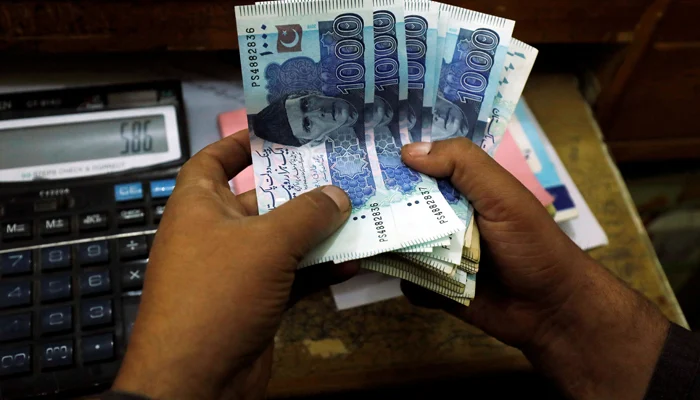- Positive impact of Pakistan-IMF deal on rupee.
- Dealers expect balanced inflow, outflow of dollars.
- IMF board to meet on July 12 for loan approval.
KARACHI: The rupee is expected to remain steady next week as the currency market hopes for the approval of Pakistan’s bailout package by the International Monetary Fund’s (IMF) Executive Board on July 12.
According to a report published in The News, dealers said on Saturday that dollar inflows and outflows are likely to be balanced.
In the interbank market, the local unit rose by 2.8% or Rs8 week-on-week.
“Over the course of the next week, the rupee is probably not going change much. The quantity of foreign currency that banks generate (via exports and remittances) must equal the amount of import payments before releasing them,” said an analyst.
“By using this strategy, the current account deficit is kept under check, and unrestricted imports are avoided,” the expert noted, adding that the State Bank of Pakistan (SBP) seemed to monitor the current account actively.
Once inflows from the IMF and friendly nations are received, it is feasible that imports may be permitted more freely.
However, according to the analyst, because payments are increasingly being accepted, businesses are not encountering substantial import delays.
Currency experts hope that the IMF will most likely approve the standby arrangement during its Executive Board meeting on July 12 and that $1.1 billion will be credited to the SBP account by July 18.
Pakistan Tehreek-e-Insaf (PTI) Chairman Imran Khan, the key opposition figure in Pakistan and a former prime minister, met the IMF team on Friday at his residence in Zaman Park, Lahore.
Khan voiced his support for the bailout deal with the global lender but sought guarantees for timely elections in the country.
The IMF stated that it was seeking the backing of Pakistan’s political parties, including Khan’s, for the new nine-month $3 billion stand-by arrangement and the policies linked with the programme in the run-up to the country’s autumn elections.
“The market does not expect any drastic movement in USD-PKR parity,” said Tresmark — a financial portal for treasury markets — in a note.
“Our last week’s projections of 275-280 till IMF approval and 282-287 post-IMF approval still hold,” it added.
The views were based on potentially significant inflows catalysed by the IMF agreement, the rupee being undervalued on a REER basis, elevated interest rates, continued management of imports, increased forex reserves on account of favourable current account deficit, and SBP’s key objective to build reserves rapidly.
Pakistan’s foreign exchange reserves held by the central bank increased by $393 million to $4.462 billion in the week ending June 30.
The country’s dollar bonds saw a correction during the outgoing week. Following the positive response to the Pakistan-IMF agreement, the country experienced a significant upswing in its international bond prices, reflecting heightened investor confidence, according to JS Global.
“However, there has been a correction in bond prices and yields this week,” it said. “Bond prices are showing on average a 7% day-on-day decline as per current prices.”
On a cumulative basis, the increase in international bond prices averaged around 26% since the recent low of June 23, 2023, JS Global stated.

 Latest News2 days ago
Latest News2 days ago
 Entertainment2 days ago
Entertainment2 days ago
 Latest News2 days ago
Latest News2 days ago
 Business2 days ago
Business2 days ago
 Latest News2 days ago
Latest News2 days ago
 Latest News2 days ago
Latest News2 days ago
 Latest News2 days ago
Latest News2 days ago
 Latest News2 days ago
Latest News2 days ago























